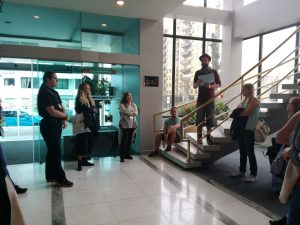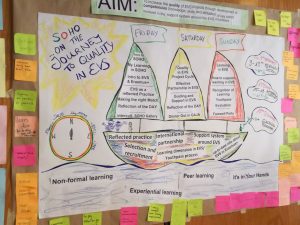- 2016/11/09
EFHR at the training course for the EVS supporters

 On November 3-7, the employees of organisations implementing the European Voluntary Service’s projects and people cooperating with volunteers from abroad on a daily basis (tutors, mentors), arrived to the little town of Villa Nova de Gaia, Portugal, in order to acquire new skills in implementing such projects.
On November 3-7, the employees of organisations implementing the European Voluntary Service’s projects and people cooperating with volunteers from abroad on a daily basis (tutors, mentors), arrived to the little town of Villa Nova de Gaia, Portugal, in order to acquire new skills in implementing such projects.
The main aim of the training “SOHO – European Training Course for EVS Support People” was to improve the quality of EVS projects by gaining new competences (knowledge, skills, attitudes). The training focused on several thematic blocks, such as understanding the concept of EVS; how to prepare a professional support system for a volunteer and for a host organisation, how to cooperate and work within the framework of international partnership or the concept of partnership in EVS. The training was attended by representatives of organisations from 18 countries, both partner countries (members of the European Union) and countries covered by the programme (Albania, Montenegro, Switzerland and Ukraine).
Within three days of intensive work, the participants of the training had an opportunity to try their hand at all the positions associated with the European Voluntary Service – they had the possibility to feel like volunteers, employees of a receiving, sending or coordinating organisations or mentors. Working in groups gave the possibility to share the experience in implementing projects and provided the foundations for the future co-operation within the framework of EVS.
What is the purpose of the European Voluntary Service?
The EVS projects realized in the framework of the Erasmus + programme aim to give young people (aged 17-30) a possibility to take up social work abroad for the period from 2 to 12 months, while all the costs of the subsistence are covered by the European Commission (find our more about the programme here). The time spent abroad is a great opportunity to grow, learn the language, broaden the knowledge about the culture and gain experience. It also contributes to personal development.
Two institutions involved in the projects are the sending organisation (the organisation from the volunteer’s country of residence) and the host organisation (for which the volunteer will be working). Both organisations are responsible for preparation of the volunteer’s travel and reintegration after his return. The costs of travel, food, accommodation and urban transport are covered and the volunteer receives pocket money. In addition, he has a possibility to follow a language course (also online).
To participate in the programme, simply contact one of the sending organisations in your country (see the list of accredited organisations) – it will provide you with a list of accessible projects – or find an interesting project yourself and apply.
EFHR



